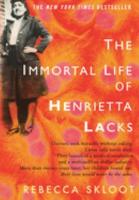
One of the most groundbreaking discoveries in the past century was a most peculiar phenomenon known as HeLa cells. While other cultured cells shortly died in a traditional lab setting, HeLa cells continued to multiply continuously, earning them the title of the first immortal cells. This gave scientists around the world the ability to conduct a variety of experiments that would lead to life-changing discoveries such as the polio vaccine and the study of HPV/HIV. However, few are aware of the woman behind the cells: a black tobacco farmer from Virginia named Henrietta Lacks. After her death due to cervical cancer in 1951, researchers at Johns Hopkins took her cells without her informed consent or that of her family, leading to the largest mass-produced cell line while the Lacks family continued to live in poverty.
In her book, Skloot visits with the surviving members of the family to gain an understanding of their situation and their thoughts on the cells. She faces setbacks along the way due to the family’s wariness; after all they had lived in the dark for so long without knowing how important Henrietta’s cells had become. However, Skloot forms a close bond with Henrietta’s youngest daughter, Deborah who is determined to preserve her mother’s legacy and ensure that she is not forgotten.
Overall, this was a very well-researched and thoughtful read. The author did a great job keeping the book engaging- it was very interesting hearing about Henrietta’s life before she died and gaining perspectives from her children /grandchildren over half a century later. This book remains very relevant today as we continue to advance in science and technology as it becomes imperative to grapple with research ethics when experimenting on humans.
